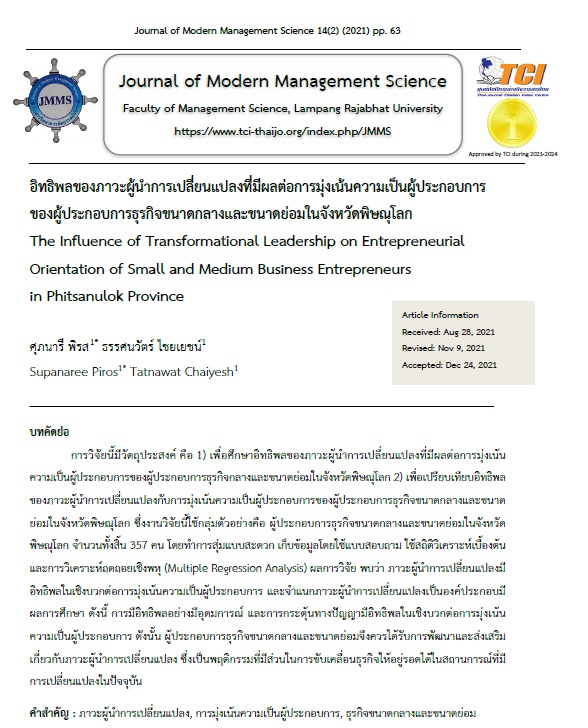The Influence of Transformational Leadership on Entrepreneurial Orientation of Small and Medium Business Entrepreneurs in Phitsanulok Province
Main Article Content
Abstract
The research objectives were 1) to study the influence of transformational leadership on the entrepreneurial orientation of small and medium entrepreneurs in Phitsanulok province 2) to compare the impact of transformational leadership and entrepreneurial orientation of small and medium entrepreneurs in Phitsanulok province. The samples were 357 entrepreneurs in Phitsanulok province by convenience sampling. The researcher collected data by questionnaire. The statistics employed descriptive statistics and multiple regression analysis in data analysis. The results found that transformational leadership influenced entrepreneurial orientation. Idealized influence and intellectual stimulation on entrepreneurial orientation. Therefore, the transformational leadership of small and medium business entrepreneurs should be developed and promoted. This behavior plays one of the crucial parts in driving businesses to survive in continuously changing situations at the present.
Article Details
The article must be considered and accepted for publication by the editorial board of the Faculty of Management Science, Lampang Rajabhat University. The articles have been reviewed by a peer (peer review) and the author must update according to the suggestion if available before publication. Articles that are not considered the editorial team will inform the results of the consideration but will not send the original to the author.
JMMS is the Faculty of Management Science journal, Lampang Rajabhat University. Jmms published both print and online editions. We allow the use of articles for academic use under the scope of copyright law.
References
รายการอ้างอิง
รุศดา แก้วมาตย์ (2558). ภาวะผู้นำการเปลี่ยนแปลงกับประสิทธิผลของธนาคารในภาคตะวันออกเฉียงเหนือ. วารสารการบัญชีและการจัดการ, 7(2), 199-215.
สำนักงานส่งเสริมวิสาหกิจขนาดกลางและขนาดย่อม. (2560). การส่งเสริมวิสาหกิจขนาดกลางและขนาดย่อมในพื้นที่เมืองเล็ก (Hinterland) : การส่งเสริม SME ในจังหวัดพิษณุโลก. กรุงเทพฯ : สำนักงานส่งเสริมวิสาหกิจขนาดกลางและขนาดย่อม.
Aaker, D.A., Kumar, V. & Day, G.S. (2001). Marketing Research (7 th). New York: Wiley.
Bass, B. M. (1985). Leadership and Performance: Beyond Expectations. New York: Free Press.
Bass, B.M . (1990). From Transactional to Transformational Leadership : Learning to share the vision. Organization Dynamics, 18, 19-32.
Boehm, S., D, Dwertmann, D., Bruch, H., & Shamir, B. (2015). The Missing Link? Investigating Organizational Identity Strength and Transformational Leadership Climate as Mechanisms that Connect CEO Charisma with Firm Performance. The Leadership Quarterly, 26, 156-171.
Boukamcha, F. (2019). The Effect of Transformational Leadership on Corporate Entrepreneurship in Tunisian SMEs. Leadership & Organization Development Journal, 40(3), 286-304.
Effiyanti, E., Lubis, A.R., Sofyan, S. & Syafruddin, S. (2021). The Influence of Transformational Leadership on Organizational Performance: A Case Study in Indonesia. Journal of Asian Finance, Economics and Business, 8(2), 583-593.
Hair, Jr., J.F., Black, W.C., Babin, B.J. & Anderson, R.E. (2010). Multivariate Data Analysis: A global perspective 7th ed. New Jersey: Pearson.
Hans, B.V. (2018). Business Environment – Conceptual Framework and Policies. International Educational Scientific Research Journal, 4(3), 67-74.
Hashim, A., Omar, C. & Hamzah, M. (2019). Mediating Role of Entrepreneurial Orientation on Relationship between Transformational Leadership, Transactional Leadership and Performance of Small and Medium Enterprises. RA Journal of Applied Research, 5(2), 2329 – 2339.
Hashim, A., Omar, C., Hamzah, M., & Umar, A. (2018). Leadership Behaviour, Entrepreneurial Orientation and Organisational Performance in Malaysian Small and Medium Enterprises. International Business Research, 11(9), 37-50.
Hayati, D., Charkhabi, M. & Naami, A. (2014). The Relationship between Transformational Leadership and Work Engagement in Governmental Hospitals Nurses: A Survey Study. Springer Plus, 3(25), 1-7.
Madanchian, M., Hussein, N., Noordin, F., & Taherdoost, H. (2015). The Role of SMEs in Economic Development: Case Study of Malaysia. International Journal of Academic Research in Management, 4(3), 77-84.
Mgeni, T.O. (2015). Impact of Entrepreneurial Leadership Style on Business Performance of SMEs in Tanzania. Journal of Entrepreneurship & Organization Management, 4(2), 1-9.
Miller, D. (1983). The Correlates of Entrepreneurship in Three Types of Firms. Management Science, 29(7), 770-791.
Miller, D., & Friesen, P. H. (1982). Strategy Making and Environment: The Third Link. Strategic Management Journal, 4(3), 221-235.
Muchiri, M., & McMurray, A. (2015). Entrepreneurial Orientation within Small Firms: A Critical Review of Why Leadership and Contextual Factors Matter. Small Enterprise Research, 22(1), 17-31.
Nunnally, J. C. (1978). Psychometric Theory. 4thed. New York: McGraw Hill.
Nunnally, J.C., & Bernstein, I.H. (1994). Psychometric theory (3rd ed.). New York: McGraw-Hill.
Obeidat, B., Nofal, R. & Masa’deh, R. (2018). The Effect of Transformational Leadership on Entrepreneurial Orientation: The Mediating Role of Organizational Learning Capability. Modern Applied Science, 2(11), 77 – 104.
Oncer, A.Z. (2013). Investigation of the Effects of Transactional and Transformational Leadership on Entrepreneurial Orientation. International Journal of Business and Social Research, 3(4), 153 – 166.
Rahman, A., Civelek, M. & Kozubikova, L. (2016). Proactiveness, Competitive Aggressiveness and Autonomy: A Comparative Study from the Czech Republic. Quarterly Journal of Economics and Economic Policy, 11(3), 631-650.
Tarabishy, A., G. Solomon, L. W. Fernald, Jr., and M. Sashkin. (2005). The Entrepreneurial Leader’s Impact on the Organization’s Performance in Dynamic Markets. Journal of Private Equity, 8 (4), 20-29.


